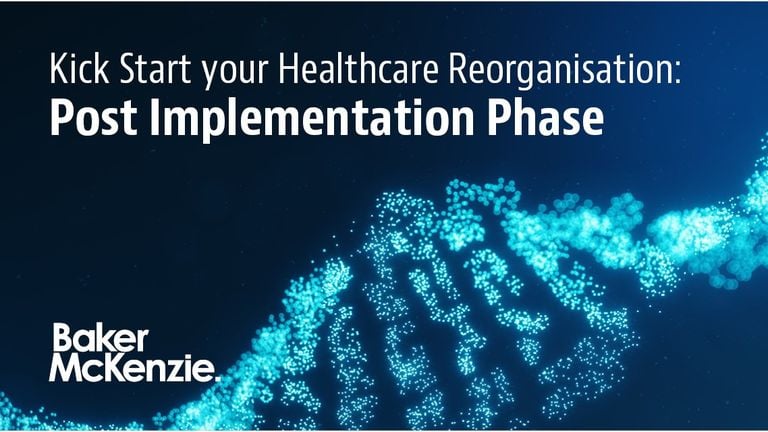In the third and final post of our ‘Kick Start your Healthcare Reorganisation’ series, we focus on the post-implementation matters often encountered on healthcare and life sciences reorganisations. These range from the many regulatory requirements through to ensuring steps are taken to realise the maximum value from the reorganisation. These post-implementation matters often bring us back to, and illustrate the importance of, careful early planning and seamless implementation.
- The significant consequences of any change of name or alteration to registered addresses should not be overlooked. Such changes have a logistical impact in any sector, but few more so than the healthcare sector where regulators have strict oversight over labelling and marketing authorisations. Updates to the name have a knock-on impact on both of these. Any alteration to labelling should be carefully considered to ensure compliance with regulatory requirements and to combat the threat of a break in supply continuity that could result in supply chain issues and a failure to meet demand. Moreover, changing entity names or registered addresses are not simple same day processes in all jurisdictions – they must be timed correctly.
- Medical information security is a significant challenge faced by healthcare businesses given the sensitivity of the data held. Where healthcare businesses are split, thought needs to be given as to how medical data is shared to enable compliance with regulatory requirements whilst balancing against patient confidentiality and data protection. Careful consideration should be given to the long term arrangements that must be implemented and consents acquired to ensure compliance.
- An awareness of specific jurisdictional requirements concerning the governance of pharmaceutical companies is essential. Questions should be asked early on as to whether certain qualifications are mandatory for those sitting on the boards of companies or holding key positions within the business.
- The developing pressure on companies to comply with, and to demonstrate compliance with, ESG requirements across EMEA, the US and beyond is requiring more evidence of thoughtful appointments of the board of directors. Are your local boards aware of their duties, obligations and responsibilities locally?
- Ensuring that you have a plan for how you will develop business functions and stand up operations to enable you to turn off services being provided under a transitional arrangement or contract manufacturing services in an orderly and timely manner.
When conducting a multi-jurisdictional reorganisation in the healthcare and life sciences sector there will be countless post-implementation requirements as a result of complex regulatory and licensing requirements which vary across each jurisdiction and apply to every aspect of business, from imports, distributions to sales and collections.
To successfully navigate each jurisdictional requirement will require careful planning and a comprehensive understanding of each jurisdiction prior to implementation such that the post-implementation phase is simply putting into action what has already been foreseen. Plan, plan and plan some more.
We hope you enjoyed this mini-series. In addition to the considerations discussed during the past three weeks, there may be more nuanced and specific items which may need to be tracked carefully for your business. Baker McKenzie has unparalleled experience with healthcare reorganisation and we would be pleased to share our experience with you.
If you would like to discuss in more detail any plans your business may have for a reorganisation, please contact Rakesh Rathod, Charlotte Nolan and Katie Sewell or your usual Baker McKenzie contact. We would be delighted to assist.
Click here to view the first post in this series – Kick Start your Healthcare Reorganisation (1 of 4)
Click here to view the second post in this series – Kick Start Your Healthcare Reorganisation: Planning Phase (2 of 4)
Click here to view the third post in this series – Kick Start your Healthcare Reorganisation: Implementation Phase (Post 3 of 4)






